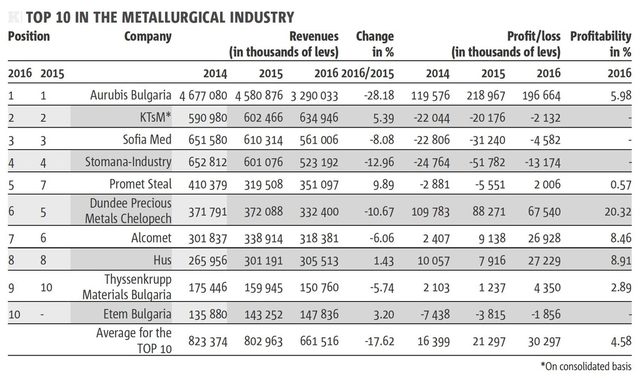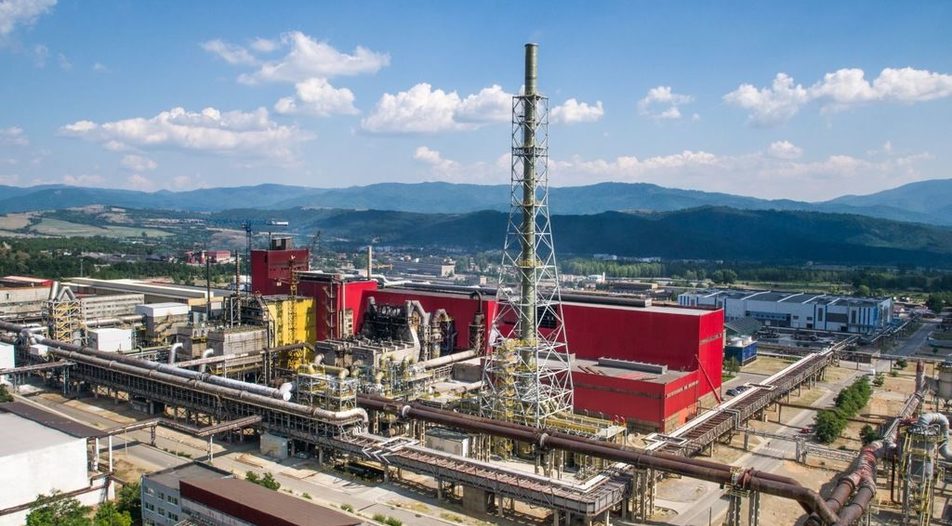The metallurgical companies in Bulgaria reported a considerable decline of revenues but higher profits overall in 2016. This is due to the lower global metal prices, which, on the one hand, have reduced the sales revenues in financial terms but, on the other, have also decreased costs. Almost all companies from the sector have thus managed to increase their profits or trim losses. The fact that the leader in the sector, Aurubis, has been idled for more than 50 days due to a scheduled overhaul of production facilities, is an important factor for the drop in the combined revenue of the top ten companies, which shrank almost 18% year-on-year.
As a whole, the enterprises in the sector operated steadily and even the problematic ferrous metallurgy got some relief last year after the EU imposed anti-dumping duties on some types of steel imports from China and thus supported European producers. The tangible decrease of energy costs was the big breakthrough in 2016 and it is the new lead plant in the non-ferrous metals works KCM in Plovdiv which takes the credit for that. The shift of most enterprises to more expensive products is also a good tendency.
Aurubis Bulgaria: shrinkage due to overhaul
The copper smelter in Pirdop owned by German-based group Aurubis kept its second position among the biggest enterprises in Bulgaria in spite of a drop in revenues by more than 28% last year. The decline was mostly due to the comprehensive overhaul in the spring of last year, when the plant halted all production activities for 54 days, sources from Aurubis Bulgaria explained. The lower revenues from sales of sulfuric acid manufactured by the company as a by-product also depressed the financial results of the company. Aurubis Bulgaria's profit fell but profitability remained high and even increased compared to the prior year: from 0.05 levs per 1 lev of net profit in 2015 to 0.06 levs per 1 lev of net profit in 2016.
"According to forecasts, this year the plant will operate at full capacity, which will result in an increase of production by around 25% and growth of profits," the company said.
At present, the company is implementing an investment programme worth 180 million euro, which will be completed in 2018.
KCM: the new lead plant
Lead and zinc smelter KCM increased its revenues last year but reported a loss, albeit a smaller one compared to the 2015 figure. The company said, however, that the bottom line figure gives an incorrect idea of what kind of year 2016 had been.
"This was one of our best years. Our operating profit increased from 24.7 million to 30.5 million levs, while the net loss was a result of a change in the exchange rate," said Roumen Tsonev, chairman of the supervisory board of KCM.
The investments made by the company in recent years were the main reason for the improved performance. At the end of the year, the plant reported its highest ever zinc output. Moreover, KCM achieved a very high level of utilization of residual zinc, which is also a result of the technological upgrade.
KCM's new lead plant, part of the smelter's 140 million euro investment programme, reached its design production capacity at the end of 2016. One of the biggest improvements achieved by the new facility concerns the cost of energy inputs.
"We recorded 40% lower costs compared to the old production method in terms of the calorific value of inputs, not in terms of prices. The costs are 10-15% lower compared to the preliminary estimates," Tsonev explained.
Non-ferrous metal products
Last year was tougher for the smelters than it was for the plants manufacturing finished metal products. The fall in copper prices, particularly in the first seven months of 2016, was the reason for the lower revenues of copper products manufacturer Sofia Med. However, the company owned by Greece's Viohalco group narrowed its loss to almost one-seventh of the prior year's value. Last year, the company invested 3.7 million euro into the manufacturing of products with higher added value.
Aluminium profiles manufacturer Etem, another member of the Viohalco group, also relied increasingly on specialised products and orders by the automotive industry. Last year, its production volume increased by 19% but the revenues marked a more modest growth due to lower metal prices. In 2017, the company will continue to rely on products with high added value and its sales to the automotive industry are expected to grow.
Investments in Shumen
Shumen-based manufacturer of aluminium products, Alcomet, reported a 6% drop in revenues but nearly three times higher profit in 2016 as compared to the previous year. The lower revenues were a result of lower aluminium prices but input costs have fallen even faster.
"The input market was favourable and we made purchases at very good prices," said Fikret Indje, one of the company's main owners and its supervisory board chairman. "We operated at full capacity thanks to demand from the European market where we export 93% of our products."
The shift in the company's orientation to products with higher added value in recent years has been crucial for the leap of its profit.
"We expect a turnover of more than 170 million euro in 2017 and earnings before interest, taxes, depreciation, and amortization (EBITDA) of around 20 million euro," said Indje.
In 2016, Alcomet launched a 36 million euro two-year investment programme, which is expected to increase the plant's annual capacity by 35% to 100,000 tonnes. The expansion of production will increase the number of employees at Alcomet by nearly 100 to a total of 1,000.
Uplift
In 2016, Bulgarian steel mills marked a slight growth for the first time since the crisis. The subsector is represented by two enterprises: Stomana Industry owned by Viohalco and Promet Steel, which is a part of Ukrainian group Metinvest. The former manufactures steel and hot-rolled steel products, while the latter makes hot-rolled steel bars from billets imported from Ukraine. Impediments to imports from Ukraine during in recent years have affected Promet Steel's performance.
Last year's drop of nearly 13% in the sales revenue of Stomana Industry was due to lower steel prices. At the same time, the volumes of special steel sold by the company grew, which resulted in a considerable shrinking of the company losses. At the same time, the results of Promet Steel show a rise in revenues of almost 10% and the company is a profit-maker.

The metallurgical companies in Bulgaria reported a considerable decline of revenues but higher profits overall in 2016. This is due to the lower global metal prices, which, on the one hand, have reduced the sales revenues in financial terms but, on the other, have also decreased costs. Almost all companies from the sector have thus managed to increase their profits or trim losses. The fact that the leader in the sector, Aurubis, has been idled for more than 50 days due to a scheduled overhaul of production facilities, is an important factor for the drop in the combined revenue of the top ten companies, which shrank almost 18% year-on-year.
As a whole, the enterprises in the sector operated steadily and even the problematic ferrous metallurgy got some relief last year after the EU imposed anti-dumping duties on some types of steel imports from China and thus supported European producers. The tangible decrease of energy costs was the big breakthrough in 2016 and it is the new lead plant in the non-ferrous metals works KCM in Plovdiv which takes the credit for that. The shift of most enterprises to more expensive products is also a good tendency.












